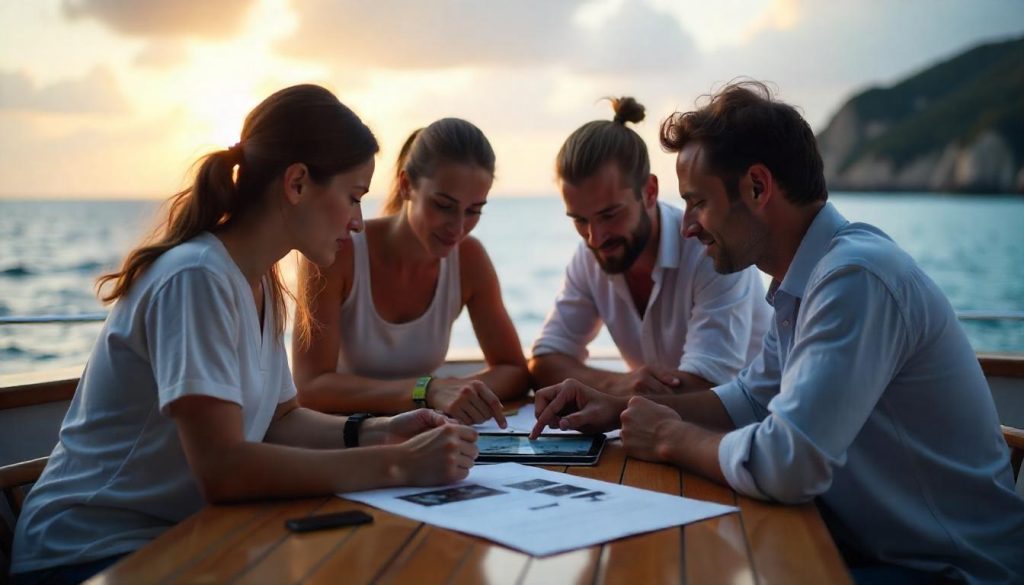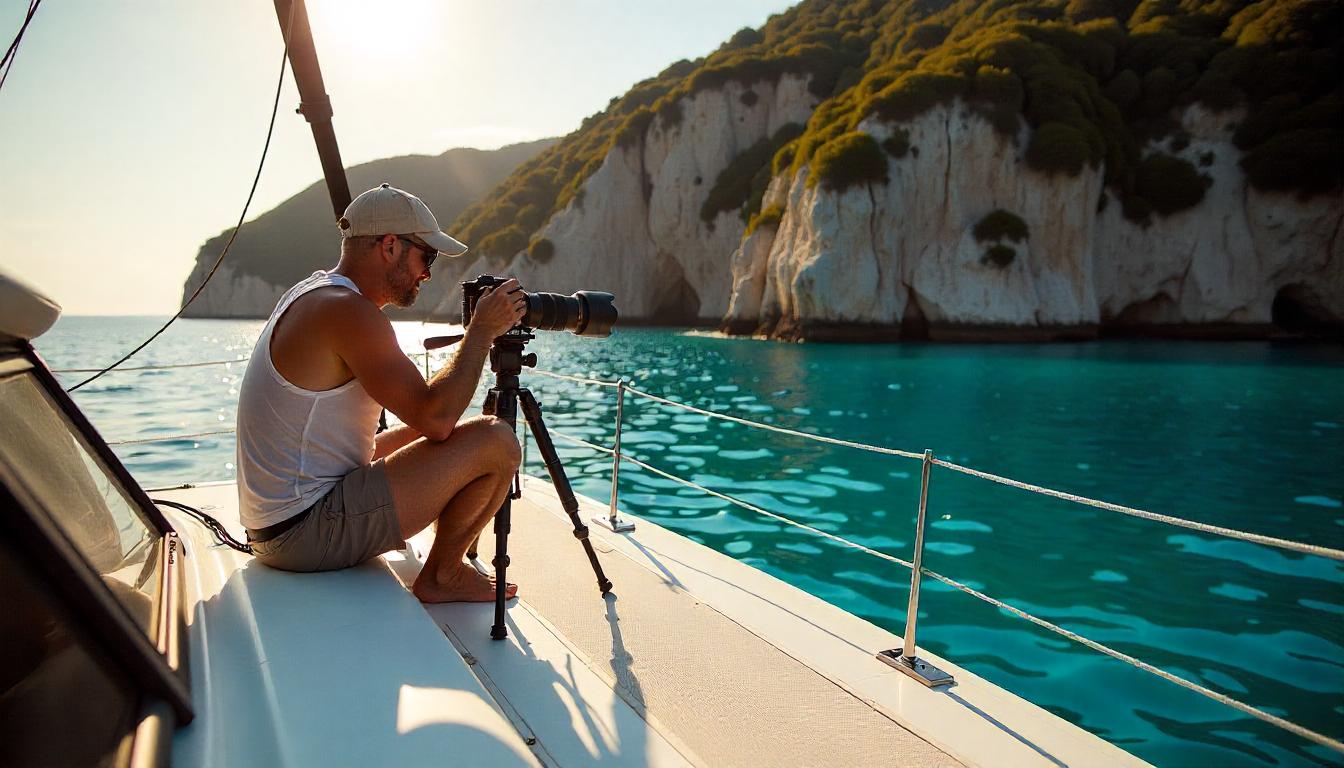For photographers and aspiring artists, the quest for unique perspectives and untouched landscapes is a constant pursuit. A yacht charter photography workshop offers a groundbreaking solution, transforming a luxury vessel into a mobile studio. This allows access to breathtaking coastal scenes, pristine wildlife habitats, and mesmerizing seascapes that are often unreachable by land. It is a fusion of a masterclass and an adventure, offering participants an immersive experience where every sunrise, every secluded cove, and every passing dolphin becomes a potential masterpiece. This guide provides a detailed blueprint for organizing a successful yacht charter for a photography workshop, ensuring both creative inspiration and logistical excellence.
Why a Yacht is the Ultimate Photo Studio
A yacht provides a versatile and dynamic environment for a photography workshop, offering a series of advantages that a land-based location simply cannot match.
Access to Exclusive Locations
A yacht’s mobility is its greatest asset. It allows you to navigate to remote coves, uninhabited islands, and dramatic coastlines that are inaccessible to land-based tours. This means your workshop can access pristine, uncrowded locations for stunning landscape photography. For example, you can anchor in a tranquil bay at sunset. Then you can spend the entire golden hour capturing the perfect light without distractions. You can also explore sea caves or rocky arches from a tender. Therefore, your photography subjects are unique and exclusive.
Unparalleled Lighting Opportunities
The quality of light at sea is a photographer’s dream. You can easily position the yacht for optimal morning or evening light. This allows for stunning sunrise and sunset shots. Furthermore, the reflective surface of the water creates a massive softbox, casting beautiful, diffused light that is excellent for portraits and detail shots. A boat-based photography course gives you the flexibility to chase the light, moving to different anchorages to capture the best conditions. You can also focus on different subjects as the light changes throughout the day.
Unique Perspectives and Subjects
The vantage point from a yacht offers unique perspectives. You can shoot low from the water’s edge in a dinghy or high from the flybridge. You can capture sweeping panoramas of coastlines, dramatic seascapes, and reflections on the calm surface. Wildlife, especially seabirds and marine life, can be a major subject. For instance, you can observe and photograph dolphins, whales, or playful seals from a respectful distance. A maritime photography tour provides a dynamic and ever-changing backdrop, ensuring your portfolio is diverse and compelling.
Designing Your Yacht Charter Photography Workshop
Meticulous planning is essential for a successful workshop. It ensures a balance between creative freedom and a structured learning environment.
Choosing the Right Destination and Itinerary
Select a destination known for its stunning photographic opportunities. The Norwegian fjords offer dramatic landscapes and northern lights. The Galapagos Islands provide unparalleled wildlife encounters. Conversely, the Greek Islands offer picturesque villages and ancient ruins. Plan a flexible itinerary that prioritizes light and subject matter. Allocate time for shooting during the “golden hour” and “blue hour.” These periods of soft, warm light are ideal for photography. You should also build in time for post-processing and critique sessions.
Selecting the Ideal Yacht for Your Needs
The type of yacht you choose directly impacts the workshop. A catamaran is often a great choice due to its stability and expansive deck space. This provides a steady platform for shooting. It also offers plenty of room for equipment. A motor yacht can cover more ground quickly. This is useful if you want to visit many different locations in a short time. Consider the number of participants. Ensure there are enough cabins and common areas for comfortable living and teaching. Check the yacht’s power capabilities. They must support all your camera and laptop charging needs.
Recruiting Expert Instructors
The quality of instruction is paramount. Hire an experienced professional photographer who specializes in the type of photography you will be doing (e.g., landscape, wildlife, astrophotography). They should be skilled not only behind the camera but also as a teacher. They must be able to provide constructive feedback. An effective instructor can inspire creativity and guide participants to new levels of skill. They can also share their knowledge of the local environment. Therefore, they add significant value to the experience.
Onboard Logistics and Equipment Management
Managing photography equipment in a marine environment requires careful consideration and planning.
Protecting Your Gear from the Elements
The marine environment poses a significant threat to camera gear due to salt spray, humidity, and heat. Participants should bring waterproof bags, hard cases, and dry boxes. These protect equipment from moisture and salt. You should also advise everyone to bring plenty of lens cloths. They are used for wiping down lenses. Always store gear in a cool, dry place when not in use. You must also establish a designated area on deck for safe shooting and storage. This prevents accidents and damage from water or sun.
Power and Charging Solutions
Photographers use a lot of power. They need to charge batteries for cameras, drones, and laptops daily. The yacht must have sufficient outlets and power converters. This ensures everyone can charge their equipment. Provide a schedule for charging. This prevents power overloads. You might also consider bringing portable power banks. They provide a backup power source during shoots ashore or on tenders. A reliable power system is critical for a smooth photo sailing trip.
Safety First: A Crucial Element
Safety is non-negotiable. The crew will conduct a thorough safety briefing upon boarding. They will explain life jacket use and emergency procedures. Establish clear rules for moving around the boat while underway. Be particularly cautious when shooting from a moving tender. Secure all equipment with straps or tethers. This prevents gear from falling overboard. Similarly, ensure all participants wear appropriate footwear and clothing.

Elevating the Workshop Experience
A successful workshop goes beyond just taking pictures. It includes community, learning, and unforgettable moments.
Post-Processing and Critique Sessions
Dedicate time each day for post-processing and image critique sessions. After a day of shooting, participants can download their photos. They can then learn editing techniques from the instructor. A critique session provides invaluable feedback. It helps participants understand their strengths and weaknesses. These sessions are also a great opportunity for participants to share their work. They can learn from each other. This collaborative environment is a hallmark of a great floating photo workshop.
Special Activities and Excursions
Integrate unique activities into the itinerary. This could include a night shoot to capture the stars, as the dark skies at sea are perfect for astrophotography. You can also organize an underwater photography session. Or you can plan a drone photography session. These excursions provide varied subjects and teach new techniques. They also add to the adventure. Organize a welcome dinner on a secluded beach. This builds camaraderie among participants.
A Focus on Well-being and Connection
A workshop on a yacht is an intense experience. But it should also be relaxing. The peaceful environment allows for mindfulness. You can enjoy gourmet meals prepared by the chef. You can swim and relax between shoots. The shared experience on a yacht builds strong bonds. Participants often form lasting friendships and professional connections.
The Lasting Impact of Your Workshop
A yacht charter photography workshop is an investment in your craft and your creative soul.
Building a Unique Photography Portfolio
Participants will return home with a portfolio of extraordinary images. These images capture the unique light, landscapes, and wildlife of the sea. The photos stand out from standard travel photography. They reflect a high level of skill and artistic vision. This portfolio can be used for exhibitions, publications, or professional marketing. It is a tangible result of the workshop.
Gaining Confidence and Expertise
The immersive nature of the workshop accelerates learning. Participants gain confidence in shooting in diverse conditions. They also master new techniques. They learn to adapt to changing light and weather. This experience prepares them for future photographic challenges. The personalized feedback from the instructor is invaluable. It helps them grow as artists. A yacht photography retreat provides a steep learning curve.
An Unforgettable Creative Journey
Beyond the technical skills, a yacht charter photography workshop is an unforgettable creative journey. It fosters a deep connection to nature and a fresh perspective on the world. The memories of the sea, the camaraderie of the group, and the satisfaction of capturing beautiful images will last a lifetime. It is a truly inspiring experience.
A yacht charter for a photography workshop offers a powerful synergy of luxury, learning, and adventure. By combining a unique location with expert guidance and a focus on creative growth, you create an unparalleled experience for any photographer. It’s an investment that pays off in stunning images, newfound skills, and an enduring passion for capturing the beauty of our world.


